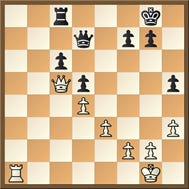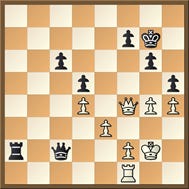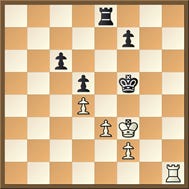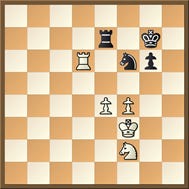In celebration of Magnus Carlsen's epic 136 move grind in game 6 of the World Championship, and because I have always enjoyed such encounters, this month I will give three of my own. Don't expect much in the way of analysis, but instead just play through the games if you also enjoy this kind of thing. I have often joked about how I save the valuable e4 thrust ( ...e5 with Black) until late in the game, so to commemorate Carlsen playing it as late as move 110, I have selected grinds in which that pawn only makes it to the 4th rank very late in each game.
Arkell, Keith - Berry, Neil
Hinkley 7/5/12
[Result "1-0"]
In the first game my advantage is only miniscule pretty much the whole time, but it can be very wearisome defending such positions for hour after hour after hour.
1. Nf3 Nf6 2. c4 e6 3. Nc3 d5 4. d4 Be7 5. cxd5 exd5 6. Bg5 c6 7. e3 Bf5 8. Bxf6 Bxf6 9. Bd3 Bxd3 10. Qxd3 O-O 11. b4 a6 12. O-O Nd7 13. a4 Nb6 14. Rfc1 Be7 15. b5 axb5 16. axb5 Nc4 17. Nd2 Nxd2 18. Qxd2 Rxa1 19. Rxa1 Bb4 20. Qb2 Bxc3 21. Qxc3 Qd7 22. Qb4 h5 23. h3 Rc8 24. bxc6 bxc6 25. Qc5
Chess engines don't think much of minority attacks because they can usually be successfully resisted with best play. However, a human must be very patient and take great care when defending the pawn weaknesses.
25.. Qf5 26. Rc1 Qe6 27. Qb6 g6 28. Qa6 Rc7 29. Rb1 Qc8 30. Qa5 Kg7 31. Rc1 Kg8 32. Qa4 Qd7 33. Rc5 Kg7 34. Qc2 Qe6 35. Ra5 Rc8 36. Ra6 Qd6 37. h4 Kg8 38. g3 Kg7 39. Qb3 Kg8 40. Rb6 Ra8 41. Qc3 Rc8 42. Qa5 Qe6 43. Rb7 Qf5 44. Qa3 Re8 45. Qa4 Rc8 46. Qa3 Re8 47. Qa6 Rc8 48. Rb6 Qd7 49. Rb1 Qe8 50. Qb7 Kg7 51. Rc1 Kg8 52. Qa6 Kg7 53. Qa4 Kg8 54. Qc2 Kg7 55. Rb1 Qe6 56. Rb7 Kg8 57. Qc5 Ra8 58. Rb1 Qf5 59. Rf1 Ra6 60. Qe7 Ra8 61. Qd6 Qc2 62. Qf6 Rb8 63. Kg2 Ra8 64. Re1 Qe4+ 65. Kg1 Qc2 66. Qe5 Ra2 67. Rf1 Kh7 68. Qf4 Kg7 69. Qe5+ Kh7 70. Qf4 Kg7 71. Qe5+ Kh7 72. Qf6 Kg8 73. Qg5 Kg7 74. Kh2 Qe2 75. Kg2 Qc2 76. Qe5+ Kh7 77. Qf4 Kg7 78. g4
My problem has been that defending against just one weakness is generally quite easy, so with g4, my favourite chess move, I try to create something else for Black to worry about.
78.. hxg4 79. Qxg4 Ra8 80. h5 Re8 81. hxg6 Qxg6 82. Qxg6+ Kxg6 83. Kf3 Kf5 84. Rh1
My advantage is still only slight but at least there are now two weaknesses to manoeuvre against - c6 and f7.
84.. Re6 85. Rh8 Rf6 86. Re8 Re6 87. Rf8 Rf6 88. Re8 Re6 89. Rc8 Rf6 90. Ke2 Re6 91. Rc7 f6 92. Kd3 Kg4 93. Ke2 Kf5 94. f3 Rd6 95. Kd3 Re6 96. Rc8 Kg5 97. Rg8+ Kf5 98. Rg1 Rd6 99. Rh1 Ke6 100. Rc1 Kd7 101. e4
And at last, on move 101, comes e4!
101..Re6 102. Ra1 Re8 103. Ke3 dxe4 104. fxe4 f5 105. Ra7+ Ke6 106. e5 c5
If Neil doesn't play this move the torture will continue as I plan Rc7 or King round to c5.
107. Ra6+ Kd7 108. Rd6+ Kc7 109. Kf4 cxd4 110. Rxd4 Rf8
To draw the game he had to play 110...Rd8, perhaps easy to find when fresh but less so after such a gruelling session. Here I can win with 111 e6 Rd8 112 Ra4 Kd6 113 Ra6+ Ke7 114 Ke5 , when Black's natural defence of 114...Rd1 fails against 115 Ra7+ Ke8 116 Kf6 and the f5 pawn gets in the way of what would otherwise be an easy draw by 116...Rf1+.
I have lost my own copy of the game, but Chessbase gives the finish as 111 Kg5 Rd8 112 Rc4+ 1-0 which doesn't make any sense, so let's just go with 111 e6.
111 e6 1-0
In the second game I ground down an IM strength player by exploiting his impatience.
Ashton, Adam - Arkell, Keith
Heywood Open 22/6/02
1. e4 c6 2. d4 d5 3. Nd2 dxe4 4. Nxe4 Nd7 5. Bc4 Ngf6 6. Nxf6+ Nxf6 7. c3 Qc7
8. Qb3 e6 9. Nf3 Bd6 10. O-O O-O 11. Re1 b6 12. Bg5 Nd5 13. Bh4 Bb7 14. Bxd5
cxd5 15. Bg3 Bxg3 16. hxg3 Rae8 17. Re3 h6 18. Rae1 Re7 19. Ne5 Bc6 20. Qd1 Be8
21. Nd3 Qc4 22. a3 Ba4 23. Qd2 Qb3 24. Ne5 Qc2 25. Qxc2 Bxc2 26. R1e2 Bh7 27.
f3 Rc8 28. Kf2 f6 29. Nd3 Bxd3 30. Rxd3 h5 31. Rde3 Kf7 32. f4 b5 33. Kf3 a5 $6
34. g4 hxg4+ 35. Kxg4 b4 36. axb4 axb4 37. Kf3 bxc3 38. bxc3 f5 39. g4 fxg4+
40. Kxg4 Kf6 41. Ra2 Rc6 42. Rf3 g6 43. Re3 Rh7 44. Ra8 Rh1 45. Rf8+ Ke7 46.
Ra8 Rg1+ 47. Kf3 Rb6 48. Ra2 Kf6 49. Rae2 Rf1+ 50. Kg4 Rc1 $6 51. Re1 Rc2 52.
R1e2 Rxe2 53. Rxe2 Rb1 54. Re3 Rg1+ 55. Kf3 Rf1+ 56. Kg4 Ke7 57. Kg3 Kd7 58.
Kg4 Ra1 59. Kg3 Ra8 60. Kg4 Ra1 61. Kg3 Ke7 62. Kg4 Kf6 63. Kg3 Rh1 64. Kg4 Rh5
65. Kg3 Ke7 66. Kg4 Kf7 67. Kg3 Kf6 68. Kg4 Rf5 69. Kg3 Ke7 70. Kg4 Kd7 71. Kg3
g5 72. fxg5 Rxg5+ 73. Kf3 Rg6 74. Ke2 Kc6 75. Kd3 Kb5 76. Rh3 Ka4
For the whole game Adam has not put a foot wrong, and he was justifiably upset with himself for losing it. However, his next move gives me a glimmer of hope. He should just sit tight and do nothing.
77. c4 Kb4 78. cxd5 exd5
And this time on move 78, though not in the standard way, my e pawn makes it to the 4th rank!
79. Rh4 Rg3+ 80. Kd2 Kc4 81. Ke2 Kc3 82. Rf4 Rg2+ 83. Ke3
Although we are still within the bounds of a draw, this non-standard position is a little
awkward for White.
83.. Rh2 84. Rg4 Rh8 85. Ke2 Re8+ 86. Kf2 Kd3 87. Rh4 Re2+ 88. Kf1 Re7 89. Kf2 Re8 90. Kf1 Ra8 91. Kf2 Ra2+ 92. Ke1 Ra1+ 93. Kf2 Rd1 94. Rg4 Rh1 95. Kg2 Re1 96. Kf2 Re2+ 97. Kf1 Re7 98. Kf2 Kd2 99. Rg5 Rf7+ 100. Kg2 Rd7 101. Rg4 Ke3 102. Kf1 Ra7 103. Rh4 Ra1+ 104. Kg2 Rd1 105. Rh3+ Ke2 106. Rh4 Rd2 107. Kg3 Ke3
I am winning now and duly converted in the blitz finish typical of those days. There are no more moves on my scoresheet, but I've tacked onto the end the way Black would win against the best defence.
108. Rf4 Rxd4 109.Rf3+ Kd2 110. Rf5 Kc2 111. Kf3 Rd3+ 112. Kf4 Rd1 113. Ke3 d4+ 114. Ke4 d3 115. Rc5+ Kd2 116. Ra5 Rh1 117. Ra2+ Kc3 118. Ra3+ Kc2 119. Ra2+ Kb3 120. Rd2 Kc4 121. Ke3 Rh6 122. Ra2 Re6+ 123. Kf2 Kb3 124. Ra5 d2 125. Rd5 Kc2 126. Rc5+ Kd1 127. Rb5 Rf6+ 128. Ke3 Ke1
My challenge to the reader is to identify where White went wrong. So after which of his first 107 moves was he first losing by force? It isn't easy!
0-1
Those of you who have read my books will recognise the 3rd grind, but I have included it as a bit of whimsy because of the lateness of e4!
Arkell, Keith - Ledger, Andrew
Eastbourne 1990
1. Nf3 Nf6 2. c4 c6 3. b3 g6 4. Bb2 Bg7 5. e3 O-O 6. Be2 d5 7. O-O Re8 8. Qc2 a5 9. d3 Na6 10. a3 Bf5 11. Nbd2 Rc8 12. Rfd1 Qb6 13. Bd4 Qc7 14. Rac1 e5 15. Ba1 e4 16. Nd4 exd3 17. Bxd3 Bxd3 18. Qxd3 Ng4 19. g3 Ne5 20. Qe2 dxc4 21. Nxc4 Nxc4 22. Qxc4 Rcd8 23. b4 axb4 24. axb4 Qb6 25. Rb1 Nc7 26. Qc5 Qa6 27. Qa5 Qxa5 28. bxa5 Na6 29. Rdc1 Rd7 30. Rb6 Ra8 31. Kg2 Ra7 32. Bb2 Nc7 33. Rb3 Ne8 34. Bc3 Nd6 35. Ra1 Ne4 36. Bb2 Nd2 37. Rc3 Ne4 38. Rc2 Rd5 39. a6 Rxa6 40. Rxa6 bxa6 41. Rxc6 Rd8 42. Rxa6 Nc5 43. Ra7 h5 44. Nc6 Re8 45. Bxg7 Kxg7
46. h3 Kf6 47. Ra5 Ne6 48. f4 Rc8 49. Ne5 Rc7 50. Kf3 Rc3 51. Ra6 Rc7 52. Nd3 Rc3 53. Nf2 Kg7 54. Ra4 Rc1 55. g4 hxg4+ 56. hxg4 Rf1 57. Ke2 Rg1 58. g5 Rc1 59. Ra7 Rc7 60. Ra8 f6 61. gxf6+ Kxf6 62. Ng4+ Kg7 63. Ra6 Re7 64. Kf3 Nf8 65. Kg3 Ne6 66. Kf3 Nf8 67. Nf2 Nd7 68. Rd6 Nf6 69. e4
And there it is!
69..Ra7 70. e5 Nd7 71. Kg4 Nf8 72. Ne4 Ra1 73. Ng5 Rg1+ 74. Kf3 Rf1+ 75. Kg3 Rg1+ 76. Kf2 Ra1 77. Rc6 Ra7 78. Kf3 Kg8 79. Kg4 Re7 80. Kf3 Kg7 81. Ke4 Kg8 82. e6 Kg7 83. Ke5 Ra7 84. Kd6 Kf6 85. Ne4+ Kf5 86. Nc5 Nh7 87. Nd7 Ra8 88. e7 g5 89. fxg5 Kxg5 90. Nb6 Rh8 91. Nd5 Kg6 92. Rc1 Kg7 93. Rg1+ Kf7 94. Rf1+ Kg7 95. Nc7 Nf6 96. Ke6 Rh6
97. Rxf6! Rxf6+ 98. Kd5 Rf5+ 99. Kd4 Rf4+ 100. Kd3
If 100...Rf8 101 Ne6+ is curtains, while 100...Rf3+ 101 Ke2 is no better.
1-0



















